More Than Half of US SMBs Use Cloud Storage – Clutch
Dropbox, Google Drive, and OneDrive followed iCloud for highest level of customer satisfaction and loyalty
This is a Press Release edited by StorageNewsletter.com on December 15, 2015 at 2:54 pmAs the cloud transforms from an obscure concept to a mainstream tool for both businesses and individuals alike, who uses cloud storage and for what tasks remain pervasive questions.
Focusing on the SMB market – firms composed of 11 to 1,000 employees – reveals that more than half of small businesses had adopted cloud storage by October 2015, according to a new survey conducted by Clutch.
But, as the quantity of SMBs using the cloud continues to increase, it is important to understand not only the trends shaping cloud storage adoption but also the ways in which SMBs use these platforms.
Our study revealed three significant findings
about SMB cloud storage adoption trends and usage habits:
- Backing up files is the primary task SMBs use cloud storage to accomplish, followed by accessing files across multiple devices, and collaborating with colleagues.
- Nearly half of respondents indicated that they access data their firm stores on the cloud from a mobile device.
- 61% of SMBs need their cloud storage services to be compliant to a standard.
Leading cloud storage service providers can use these findings to adjust their platforms’ features and capabilities to better meet SMB cloud storage needs.
Cloud Storage Usage and the Service Providers of Choice for SMBs
Overall, the survey found that more than half of SMBs use cloud storage.
While the data indicates that a majority of SMBs use cloud storage, a large proportion have not migrated to the cloud yet.
This room for growth can be attributed to a lack of knowledge about the capabilities and benefits cloud storage can offer small businesses.
“[Small businesses] may not understand how to leverage cloud storage. I think many small businesses will actually avoid the cloud if there are other alternatives that are easier for them to understand,” said Dave Linthicum, SVP, Cloud Technology Partners, Inc.
Lack of knowledge about the cloud fosters a fear of the cloud, according to David Amaya, consultant, Cardinal Solutions. “Many small businesses know just enough about the cloud to be afraid of it and say, ‘I’m not touching that.'”
A large source of this fear arises from security and compliance concerns. However, other factors also contribute to this apprehension, including the lack of human resources available in a small business environment to implement and manage the cloud and the assumption that the cloud is for enterprises only.
“Small businesses may not have the staff…to deploy and manage the integration required to take full advantage of the cloud. Another factor may have to do with how small businesses view the cloud. They may see it as an enterprise-only platform,” said Kevin McDonald, instructor, Georgetown School of Continuing Studies, Master of Professional Studies and Technology Management
Despite these explanations, Viktor Bogdanov, head of marketing and PR, Intersog, expressed surprise that SMBs were not using cloud storage, especially considering its money-saving benefits. “Physical servers are very expensive to own and maintain, and private or public cloud storage can save businesses, especially small- to medium-sized businesses, a lot of money that could be used to improve operations or become more innovative,” he said.
Delving deeper into cloud storage usage patterns revealed that most SMBs choose Dropbox. Google Drive, Apple iCloud, and Microsoft OneDrive followed Dropbox as the most popular cloud storage service providers for SMBs.
Multiple factors contribute to the cloud storage service SMBs select.
First, brand recognition plays a big role.
“I believe Dropbox is so popular among small businesses because of the marketing. … They really focus on consumer outreach and their brand presents the use case perfectly: you have data on your computer, but you need it in other places, so you drop it in a magic box,” said Amaya.
Second, ease of use makes a service more appealing.
“Dropbox has done a good job at removing barriers, such as set up, and they make it easy to replicate across all of your devices and computers, whereas Google most likely was not as quick to do this,” said Linthicum.
While Dropbox was the most popular provider when looking at the frequency with which SMBs select it as a service they use, another way of identifying cloud storage services that meet SMB needs is through a Net Promoter Score (NPS). The NPS measures customer satisfaction and loyalty by asking the question, “How likely is it that you would recommend this service to a friend or colleague?”
When looking at the NPS, Apple iCloud emerged on top.
Dropbox, Google Drive, and Microsoft OneDrive followed Apple iCloud as the cloud storage services with the highest level of customer satisfaction and loyalty.
What factors determined these NPS scores? Overall, it seems brand recognition and appeal contribute to SMBs’ impressions of and satisfaction with their cloud storage services.
For example, iCloud’s close connection to Apple grants the service significant name recognition and automatic trust.
“Because iCloud is associated with Apple and is integrated with Apple devices, such as the iPhone and iPad, its high NPS may arise from a familiarity with Apple. It’s name recognition,” said McDonald.
Additionally, the ubiquitous use of Apple devices makes iCloud appealing as a backup and integration service.
“iCloud is valuable to me because it makes my device a disposable item. … Dropbox is more of a file-sharing service. … I believe the ‘Apple saved my butt’ scenario is more useful to people, whereas Dropbox has many of the same capabilities but is not associated with restoring and saving data from lost devices and other catastrophes,” said Linthicum.
SMB Cloud Storage Adoption Trends
Since 2011, the amount of SMBs integrating cloud storage into their companies has increased, with the majority adopting the service between 2011 and 2015.
Of the 52% of SMBs using cloud storage, nearly all of them, 46%, adopted the service between 2011 and 2015.
No single event triggered the increase in cloud storage adoption. Rather, cloud thought leaders attribute the trend to three factors.
First, cloud storage facilitates file sharing within a small business, making daily tasks more efficient and communication more open.
“I think the need to share files is the main reason why small businesses adopt cloud storage. … This ability to collaborate through file sharing has been out of reach for small businesses until storage services, like Dropbox, Apple iCloud, and Google Drive, started putting out inexpensive, manageable systems,” said Linthicum.
Second, as the cloud receives more media attention, it will become an accepted practice to incorporate the service into a business.
“There’s a lot more media coverage of the cloud, and there is a significant increase in awareness of the cloud as an option for small businesses. Cloud adoption may be becoming more widespread because of this new awareness,” said McDonald.
Third, the benefits of cloud storage become more prominent as the quantity of SMBs using cloud storage increases.
“I think the increased adoption is a sign of gradual growth as more businesses realize cloud storage is benefiting them. It will keep growing incrementally until there is a tipping point, and then, everybody will get on-board and wonder what life was like before cloud storage existed,” said Amaya.
How SMBs Use Cloud Storage
A deeper understanding of cloud storage usage trends demands questioning how small and medium companies incorporate the serviceinto their business model.
- What are SMBs’ needs when it comes to the cloud?
- What capabilities and tasks do they prioritize?
- What concerns color their decisions when selecting a cloud storage provider?
“When it comes to selecting a cloud storage service, it is really important to understand your business’s needs,” said Amaya.
SMB cloud storage prerequisites center around the type of information they need to store, the tasks they need to accomplish, the level of security and privacy they need to keep data safe, and the quality of performance they need to accomplish multiple tasks.
How SMBs use cloud storage encapsulates a few factors:
- Devices used to access data stored on the Cloud
- Tasks small businesses use cloud storage to accomplish
- Compliance implementation
One benefit of using cloud storage is the ability to access data and files from multiple devices when connected to WiFi. SMBs identified cloud storage mobile capabilities as a priority, with nearly half of respondents noting that they use a mobile device to access data their firm stores on the cloud.
The accessibility of information stored on the cloud through mobile devices helps SMBs boost efficiency and adds an element of immediacy to business interactions.
“The great thing about Dropbox and other storage as a service systems out there is that if I am on the road and someone asks me to answer a question, I don’t have to wait until I get back home. I have access to my files directly on my iPhone or iPad. I can access my files and give the person an immediate response,” said Linthicum.
Similarly, Bogdanov describes cloud mobile access as the personification of the technology’s goal: “remote use, ubiquitous accessibility, and security.”
However, despite this benefit, mobile access poses a security risk.
“If you’re a small business and work in healthcare, you have to be careful about how you use your data. You wouldn’t want a person’s health information to be downloaded onto a device that isn’t secured properly,” said Amaya.
When selecting a cloud storage service provider, it is important to pinpoint the tasks businesses prioritize.
Backing up files is the activity SMBs identified as the primary task for which they use cloud storage.
According to cloud thought leaders, this prioritization of file backup makes sense.
“It’s like sticking your toe in the pool that is cloud storage possibilities,” said Amaya
The backup, recovery, and restoration solutions cloud storage provides, benefit SMBs by reducing the overall cost of managing data.
“Cloud storage allows for a significant reduction in the TCO, as compared to the purchase and maintenance of robust backup systems. Small businesses can take advantage of cloud backup capabilities to save a significant amount of money,” said Bogdanov.
Although collaboration is an important cloud storage feature, it is not as high a priority in the SMB environment.
“In comparison to this feature, collaboration is not as important for small businesses because the work groups are so small. Collaboration is much easier in these environments,” said Linthicum.
Another factor that determines which cloud storage service SMBs choose is compliance implementation. 61% of small businesses need their cloud storage services to be compliant to a standard in order to operate.
Compliance contributes to fear of the cloud, according David Amaya. “Another factor slowing adoption of cloud storage among small businesses are concerns about security and compliance. … You want your data to be secure and compliant, especially if you are working in healthcare or with credit card information, which demands being HIPAA and PCI compliant, respectively.”
However, the necessity of compliance is one factor SMBs must embrace to harness the cloud’s potential in the future.
“Managing big data will be too expensive and cumbersome, so the cloud will become the most appropriate hub for any big data initiatives. So, I believe more small businesses will be rushing to the cloud if they intend to translate their raw data into valuable insights and business intelligence,” said Bogdanov.
About the Survey
The full survey included 744 respondents from SMBs in the US. Of the total respondents surveyed, 438 used cloud storage. The survey was conducted throughout October 2015. The total number of respondents varies for each question.








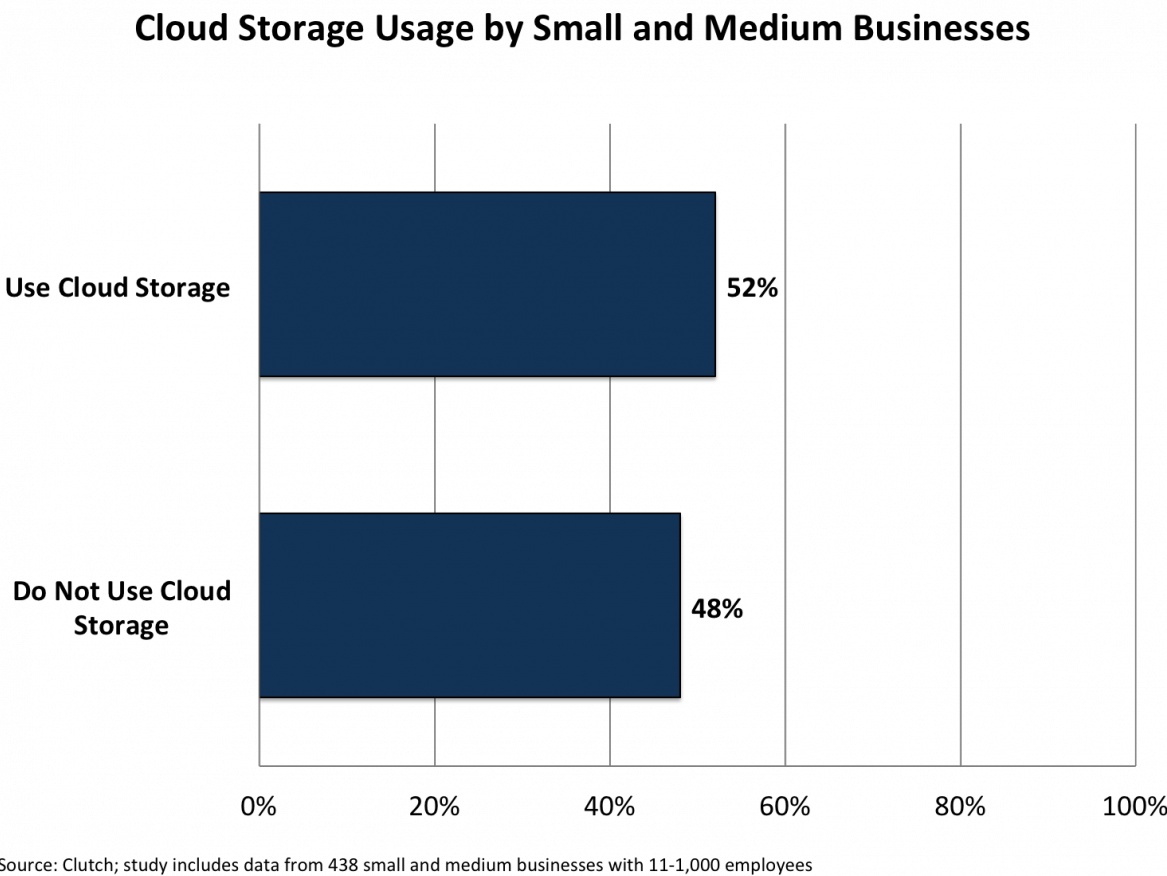
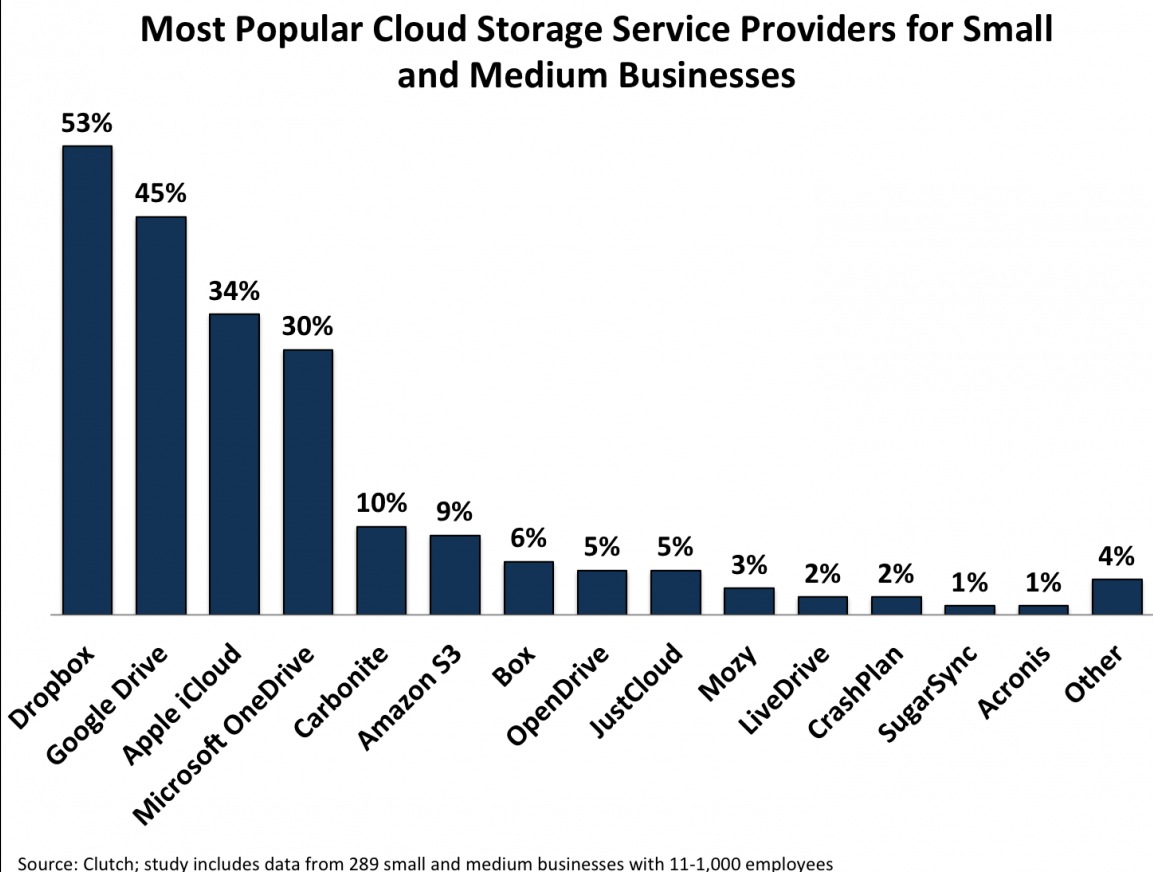
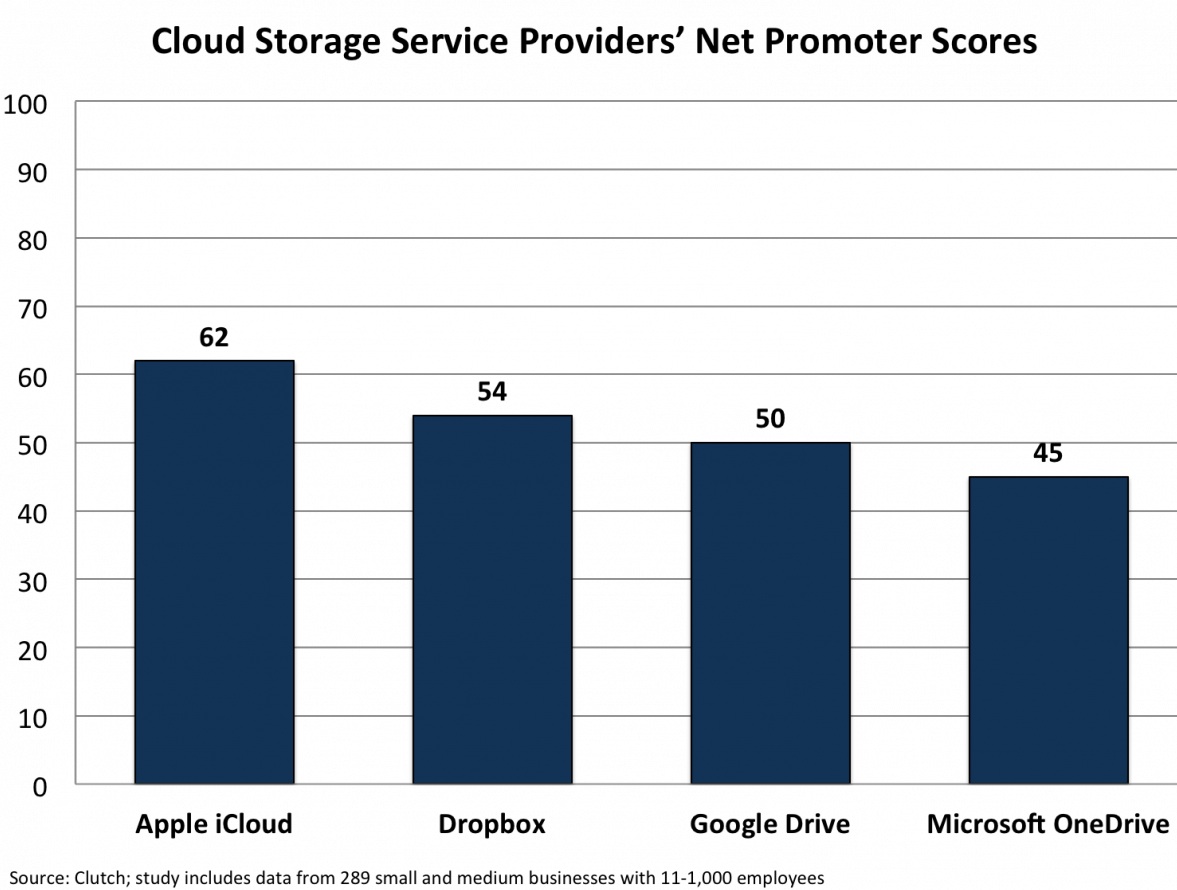
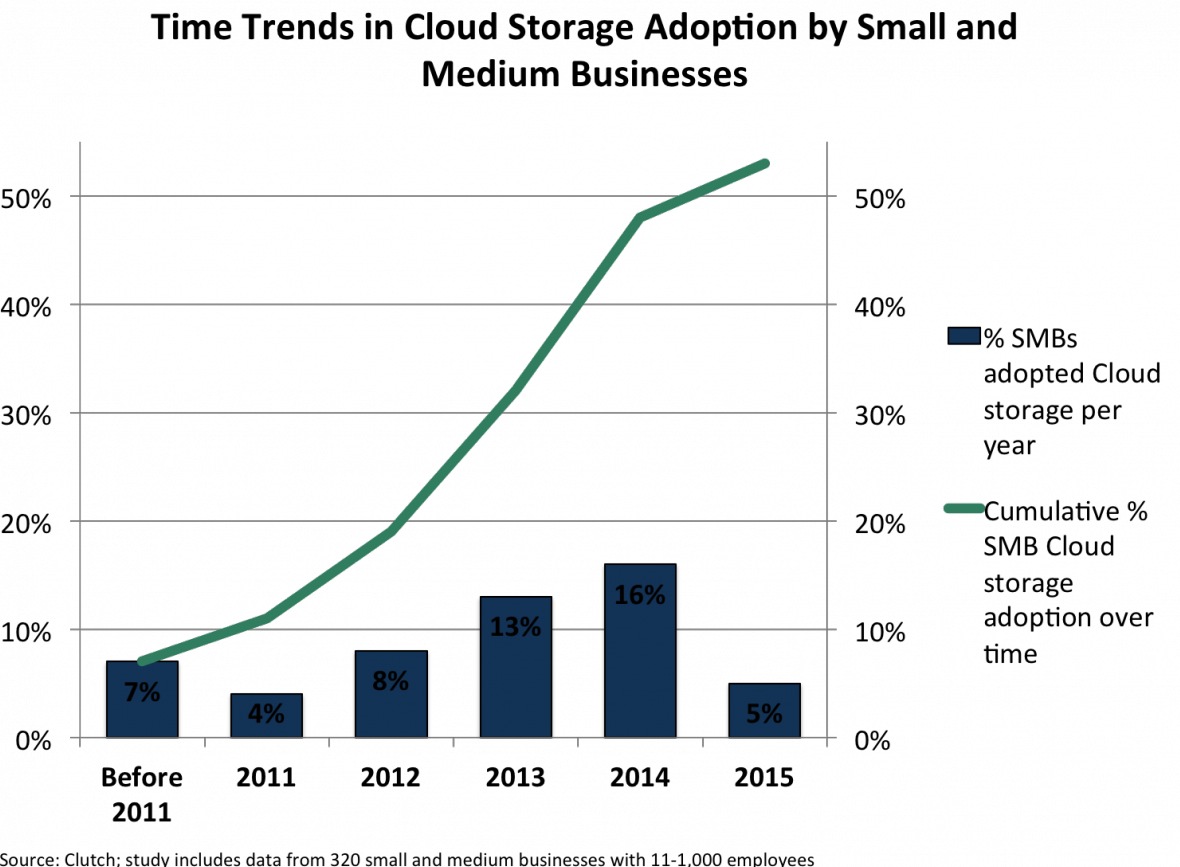
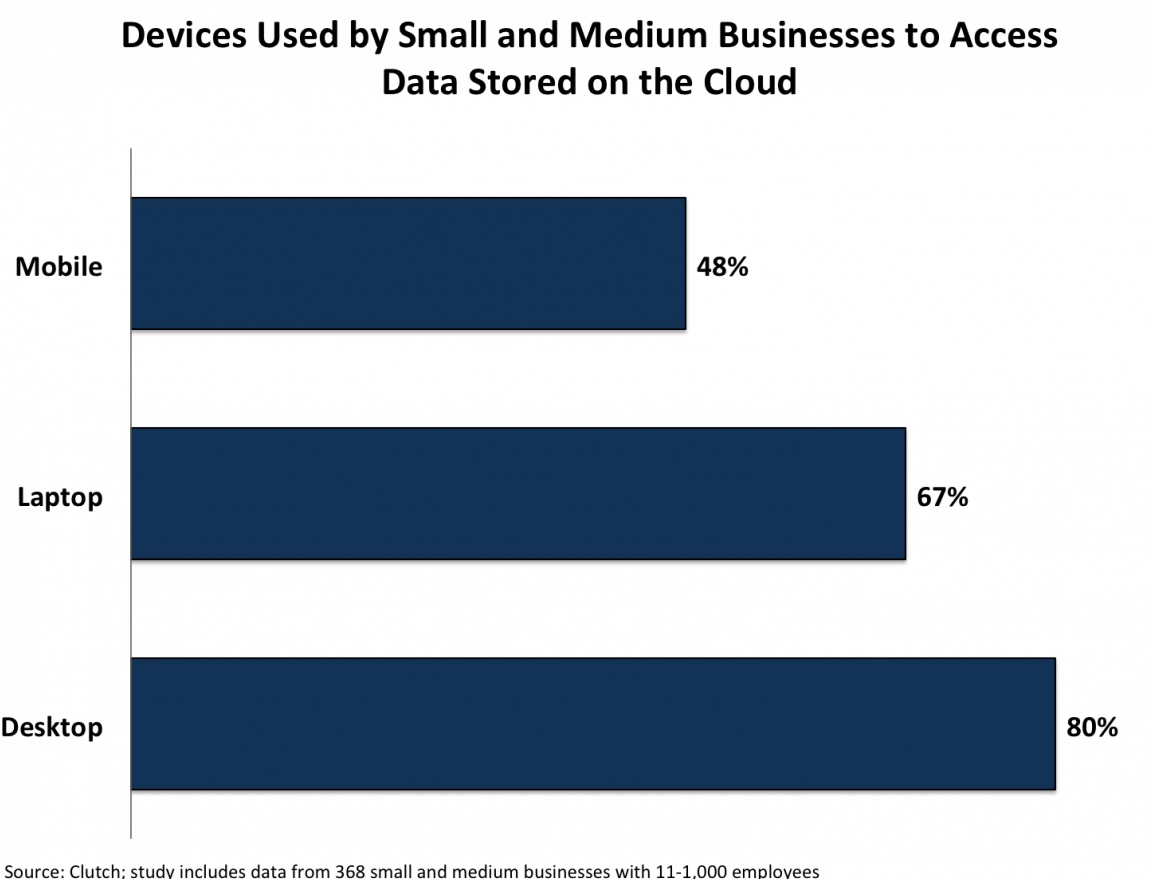
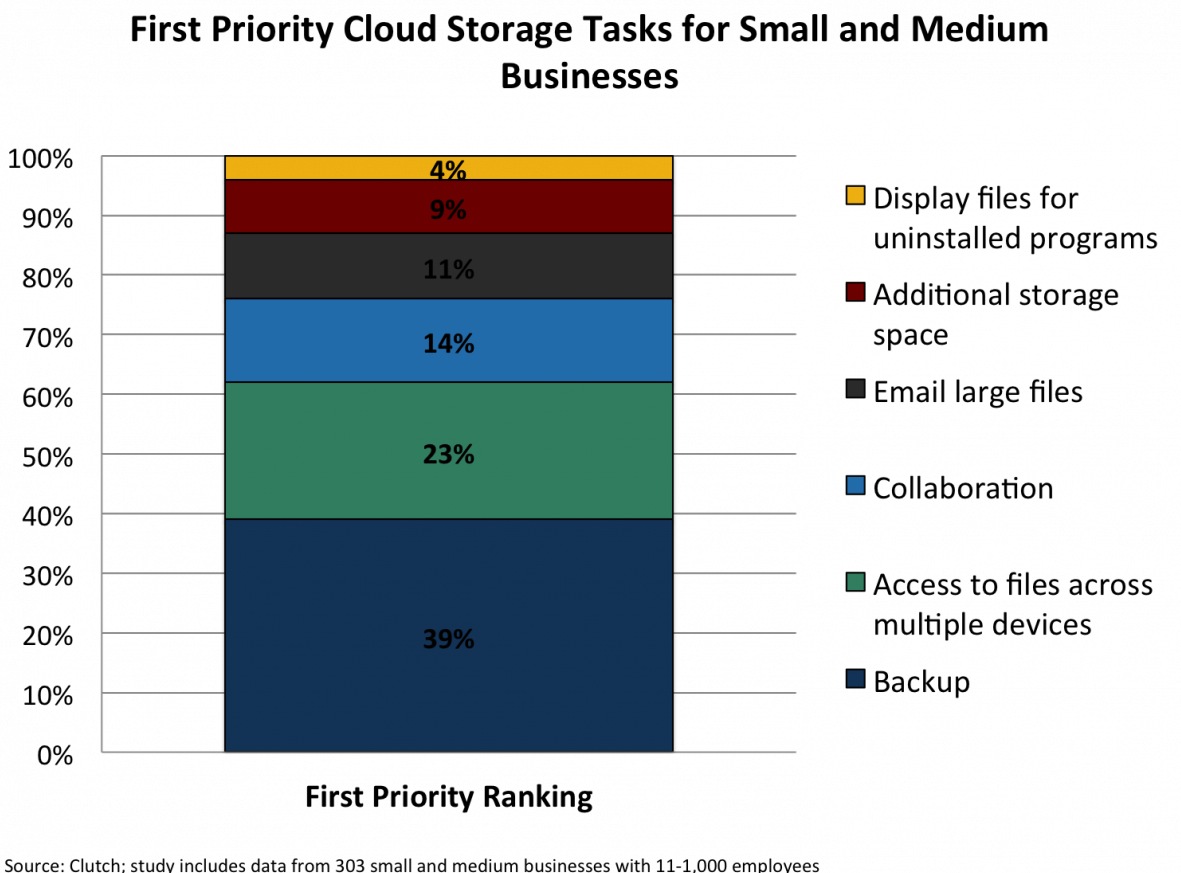
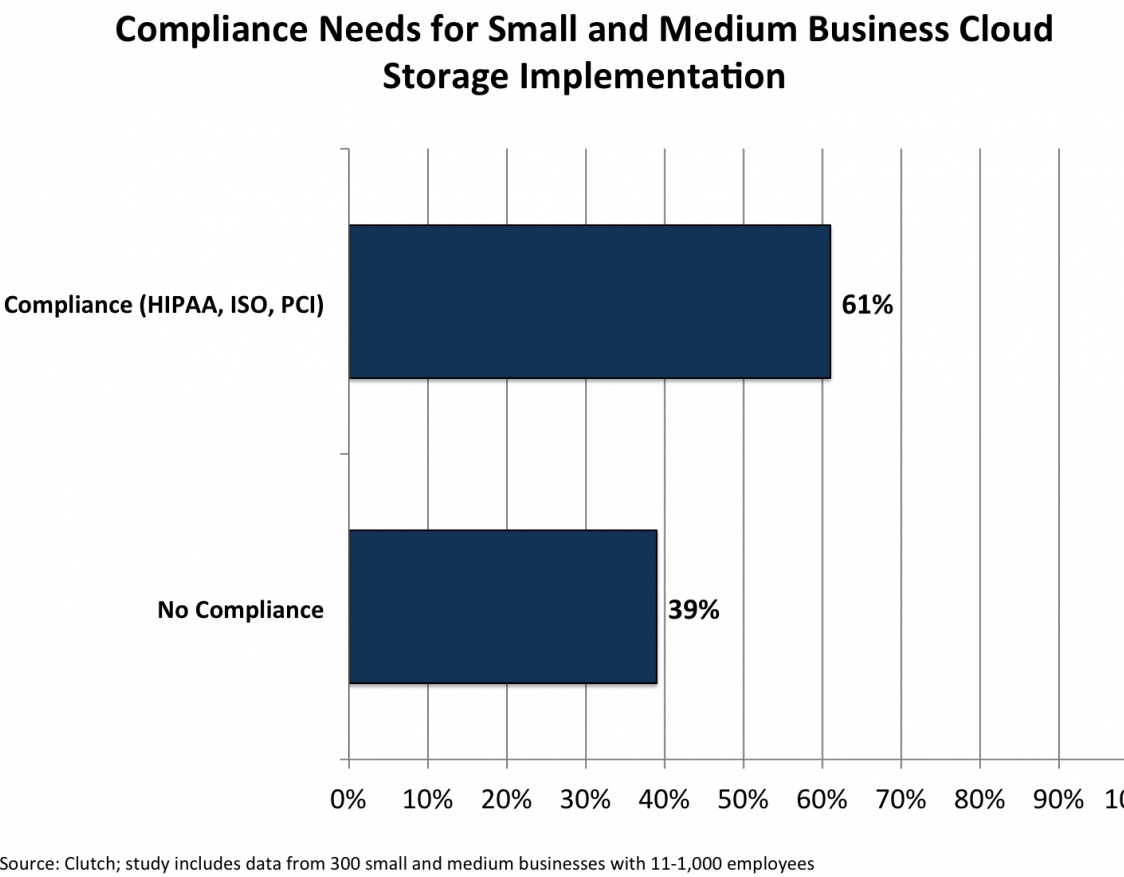
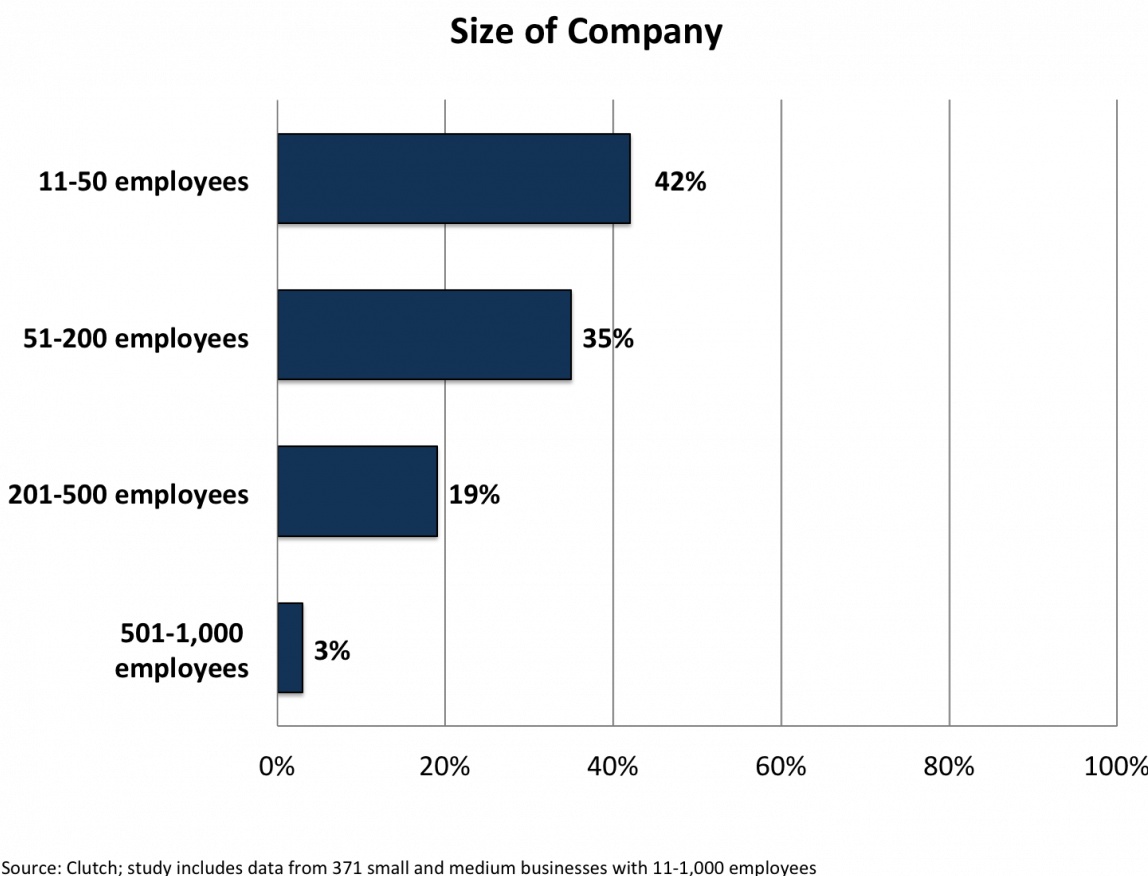






 Subscribe to our free daily newsletter
Subscribe to our free daily newsletter

